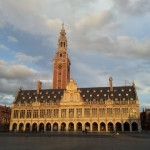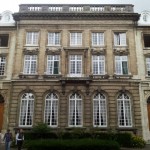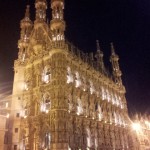Johannes Rabie’s memoir of KU Leuven’s Summer Camp on Entrepreneurship and Innovation
Pre-Departure:
The summer camp is held in the European summer, which is a busy tourism time for the region. Accommodation is therefore probably the first thing that needs to be booked, in order to secure those bargains! To me, accommodation is a no-brainer – Hostels. One, they are the cheapest form of accommodation. Two – they offer everything you need as a traveller, and more! A bed, bedding and towels, breakfast, free Wi-Fi, lockers and laundry services (mostly at extra cost) are amongst the basic services that all hostels offer. But probably the most valuable is the experience. You get to socialise with people from around the world who, like you, are keen on travelling and experiencing different people from interesting places which they have only ever heard of.
Flights are as important and urgent as accommodation. And proof of both are necessary for the Visa application. Generally Middle Eastern airline operators are the cheapest, and offer truly world class services and in flight experiences. Here Emirates and Qatar are two that come to mind. Both fly via their base cities to any of the large cities in Europe. Therefore a flight to Brussels is easily obtained. However, remember that a lay-over at the base city will be part of the itinerary. But with the shopping and dining experiences at Dubai, this might not be a bad thing. And sometimes, luck is on your side, because if a lay-over is longer than 8 hours (applicable if no other option is available, whether cheaper or more expensive), Emirates Airlines offers a free temporary visa and accommodation. Therefore, an opportunity to go into Dubai! Take a cab for $10 to go see the Birj Khalifa! Amazing! Otherwise, they always offer a free meal voucher obtainable at any Emirates counter. The buffet option in Terminal A is a must if you want to get your free voucher’s worth!
The visa application is not as painful as many sources would suggest. In fact, for all my previous applications I have been over prepared. But considering that you have to make appointments, and that Schengen State embassies are generally only located in the larger South African cities, you don’t want to be denied or sent back once there. So rather go the extra inch or two. Visas technically need to be applied for at the embassy of the Schengen State in which the longest part of your travels will take place. In the case of the summer school this will probably be at the Belgium embassy. Fortunately, the Belgium embassy is really efficient and the personnel are very friendly. And they are far more relaxed and less busy than other Schengen State embassies such as the French, German and Italian embassies. Therefore, an appointment can be obtained fairly easily and within a short period from the initial application (remember this if you ever travel to Europe and visit more than one country). And if you have successfully applied for a Schengen Visa previously, remember, you don’t have to make an appointment to see them in person. The reason why they require of you to go in person is to obtain your biometric details (finger prints). If you have previously done them, it has been saved onto the Schengen Visa system. Just consult the procedure to send a digital application. Visas take about a week to complete and can be sent to the applicant via post.
In terms of money, your bank is a good place to consult regarding travel wallets (cash cards) and cash. In my opinion cash is the least trouble to obtain, and can be used everywhere and for everything, even that random taxi ride. However, there is a bit more risk involved than the travel wallet/card option. This card is however not always usable. Frustration vs comfort vs risk? I personally prefer taking only cash, and keeping a reserve on my credit card. It is only a quick visit or phone call to your bank to give authorisation for your credit card to be used abroad. The cash amount will then only include what I budgeted, plus a bit extra. If exchanging cash, Inter Africa Bureau de Change in Dorp Street offer the best rates, with no commission.
Experience at Summer School:
The Summer Camp on Entrepreneurship and Innovation is a very good balance between lectures and presentations by industry experts and professors in the field, as well as industry visits to some of the most innovative and cutting edge research and manufacturing companies in Belgium. This ensure that any kind of student would find this strictly spoken commerce-orientated summer camp most interesting, perhaps being enjoyed the most by engineering students such as myself. This is especially true since many of the companies visited are high tech research and development companies.
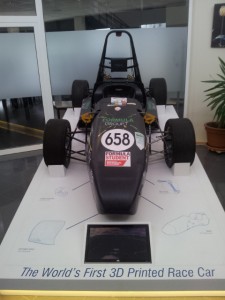
Lectures and presentation topics of this specific summer school included insights into international and European trends regarding entrepreneurial companies, economic factors influencing start-ups, legislation governing start-up companies, knowledge centres and knowledge sharing trends in today’s world, venture capital in European context, and European Union market and corporate governance insights. Industry visits included, amongst others, visits to IMEC (micro- and nanoelectronics research centre), ThromboGenics (integrated biopharmaceutical company), LMS (Simulation and Testing Solutions), Materialise (3D printing and software solutions), and the OECD in Paris. The course was concluded by a brief two hour essay test, covering the concepts and industry insights that were gained and experienced during the summer camp.
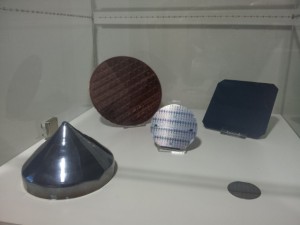
On the more relaxed side of life, the summer camp’s activities include an afternoon visit to Paris, and a day off in Bruges and Ypres, two beautiful and historically rich cities. Most definitely very interesting and fun excursions.
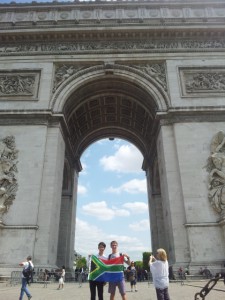
The summer camp’s activities were all very well organised, and creates a great environment to enjoy a study experience in a different country with students from across the world. If your passions include meeting interesting people from around the world, such a summer school is a great opportunity to do this. Despite the program and days being full, it is not draining, due to the constant changing of lecture environments and the interesting industry visits.
Having not studied commerce related subjects in my time at Stellenbosch, content of the programme cannot be compared. However, teaching methods, facilities and aids that were used, compare well with those being used at Stellenbosch. Like Stellenbosch, KU Leuven is a regional leader when it comes to tertiary education and academic research, and it is visible in the way courses are structured, in student and university interaction, and the rich heritage they are proud of. Furthermore, the campus is beautiful, with parks, rivers and large open spaces, similar to what is around Stellenbosch University.
The lighter experiences of the trip:
The weather in Belgium/Europe is lovely. Rain is common, but it doesn’t become very cold. Take maximum two pieces of warm clothing along. And don’t be shy to put in the sandals and Havaianas/plakkies.
Leuven is like a 1000 year old Stellenbosch (or similar student town). In the university break, the town is much quieter than the usual bustling atmosphere during the class periods. And with the added 800 years of history, there is much that makes up for the lack of mountains and close by natural beauty Stellenbosch offers. And don’t forget to get lost in the city on random strolls, keeping your mind blank and merely taking in the beautiful architecture and history. Walking around at night in the centre of town is perfectly OK.
Leuven is a small city, and one doesn’t need to buy public transport passes to get around on your own. Everything is within walking distance. Any travelling associated with the Summer School will be arranged for, or will involve walking.
Be sure to try many of the 1400 beers brewed in Belgium. The Capital on the Grote Markt offers 2000 beers in its menu! Cherry, apple, barrel matured, wine beer, etc. are some of the strange brews they have come up with… Belgium waffles and fries truly are much more delicious than those in other countries. So keep the extra Euro or two for a random splurge once in a while. And of course, don’t forget about the famous Belgium chocolates…
In terms of travelling to other cities, many big and famous metropolitans are fairly close to Leuven. So use those spare hours for a quick 30min train ride to Brussels to see the capitol of the European Union. Amsterdam, Cologne, and even Paris are also easily accessible.
If you are managing a tight budget, refrain from eating out – a meal and drink can easily cost 15 Euros. Supermarkets are far more economical. And as for souvenirs, the general trend as in all European countries is followed. Perhaps get a KU Leuven shirt (20Euro), sweatshirt (35Euro) or bag (20Euro), as a special memory.
Return:
Being only a week, and spending time in a Westernised society, the adjustment to life in Leuven, and the return to SA, was not a big one. And due to the relatively relaxed academic programme, the mental strains were minimal. This summer school is a great way to experience studying abroad, with people from different backgrounds and cultures, and to experience it all in a culturally different society. If your objective is to truly experience a study experience abroad, then this course is perhaps a tad too short, with a two to four week course possibly providing a better experience in this regard. But what a way to get a taste of it, especially if you don’t immediately see yourself spending a long time abroad.
Being mostly commerce orientated, this course was not in my field of expertise. However, its holistic micro and macro approach to covering the various topics, allowed for a broadening of knowledge spheres for me. It awakened my thoughts a lot to being aware of the bigger economic world around us, as well as some of its main drivers. And of these drivers, innovation and entrepreneurship are very significant and vital. And it cultivated an interest in many of the economic subjects covered – My thoughts have definitely been influenced regarding the importance and significance of always seeking opportunities for advancement, pushing the boundaries, and more importantly, making these ideals a reality, using the right channels, and a lot of sweat.
Coming back and reflecting, two things are undeniable about Stellenbosch:
- It is a world class university, being on par with the leaders around the world in terms of infrastructure, academic programmes and standards, opportunities for students, and varsity life in general. We don’t have to stand back for anyone. If not on par, we are ahead of universities such as KU Leuven.
- I must commend Stellenbosch’s programmes that support research and entrepreneurial initiatives, such as the Launchlab. So many parallels can be seen in the emphasis the two universities mentioned place on these two very important drivers of progress and growth. Although Stellenbosch is a couple of years behind, the similarities in initiatives and drivers are impressive and makes one very proud to be associated with Stellenbosch.
In the same breath as the above, it is encouraging to see similarities in a South African context, not only on the tertiary educational level, but also on governmental levels. However, it has also been seen that an even greater focus needs to be placed on these two factors that are imperative for growth and progress in our country.
All in all, a great trip! Truly enriching, and a lot of fun. A big thank you is extended to the PGIO for the opportunity and support, both financially and administratively. I was a huge privilege, and on that I wish for all students studying at Stellenbosch. Go on, put yourself out there. It will be life changing…
Carpe diem!


